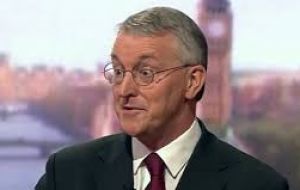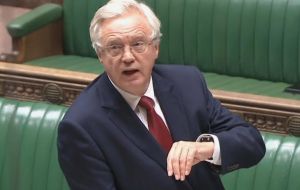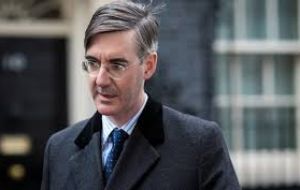MercoPress. South Atlantic News Agency
Influential Commons Brexit committee in split vote, calls for UK to consider EEA and EFTA membership
 Labour chairman of the committee Hilary Benn admitted setting “a high bar”, but added they were based on pledges of the Prime Minister and the Brexit Secretary.
Labour chairman of the committee Hilary Benn admitted setting “a high bar”, but added they were based on pledges of the Prime Minister and the Brexit Secretary.  Brexit Secretary David Davis has previously ruled out both options, calling them “in many ways, the worst of all outcomes.”
Brexit Secretary David Davis has previously ruled out both options, calling them “in many ways, the worst of all outcomes.”  The recommendation caused splits, with prominent Tory Brexiteers led by Jacob Rees-Mogg voting against its inclusion.
The recommendation caused splits, with prominent Tory Brexiteers led by Jacob Rees-Mogg voting against its inclusion. The influential Commons Brexit committee has called on the UK Government to consider negotiating continued membership of the European Economic Area (EEA) or joining the European Free Trade Association (EFTA) after Brexit.
Brexit Secretary David Davis has previously ruled out both options, calling them “in many ways, the worst of all outcomes.”
However the cross-party committee, in its report on the future UK-EU relationship, recommended that if negotiations on a “deep and special partnership” proved unsuccessful, EEA/EFTA membership should “remain an alternative”.
The recommendation caused splits in the committee, with prominent Tory Brexiteers led by Jacob Rees-Mogg voting against its inclusion. The committee’s Brexiteers also voted against the report in its entirety, but were defeated 10-6.
In addition to the recommendation, the committee also set down 15 “key tests” for the UK Government’s final deal with the EU to pass. The guidelines covered everything from the Northern Ireland border issue to the free flow of data between the UK and EU post Brexit.
Labour chairman of the committee Hilary Benn admitted to setting “a high bar” with the tests, but added that they were based on the past pledges of the Prime Minister and the Brexit Secretary.
He said: “Our tests set a high bar but they are based on the Prime Minister’s vision for our future outside the EU and the statement by the Secretary of State for Exiting the European Union, David Davis MP, that any new deal would be at least as good as what we have now.”
“It is vital that UK businesses are able to continue to trade freely and sell services into our largest market after we leave, without additional costs or burdens or a hard border in Northern Ireland and that we maintain close co-operation on defence, security, data and information sharing and consumer safety.”
He added: “Should negotiations on a ‘deep and special partnership’ not prove successful, we consider that EFTA/EEA membership remains an alternative which would have the advantage of continuity of access for UK services and could also be negotiated relatively quickly.”
The committee’s tests included keeping an open border between Northern Ireland and the Republic of Ireland, co-operation on crime and terrorism and tariff free trade between the UK and EU.
The report also calls on the Government to maintain convergence with EU regulations in “order to maximize access to European markets” and advises that any new immigration arrangements “must not act as an impediment to the movement of workers providing services across borders”.




Top Comments
Disclaimer & comment rules-

-

-

Read all commentsIf membership of either of these organisations interferes with our ability to trade worldwide we shouldnt join.
Apr 08th, 2018 - 10:04 am 0The new housing minister Dominic Raab agrees with me. High net immigration of several million people over the last few years has raised house prices because demand has exceeded supply. Experts at his Ministry say that prices have been forced up 20% by immigration alone.
No-one has been able to disprove it.
AFAIK it wouldn't, because they don't include the customs union so we would still be able to make free trade deals with 3rd countries. (And they don't involve sharing fisheries either.) However, membership in the EEA means staying in the single market which means continued immigration.
Apr 08th, 2018 - 01:10 pm 0Apparently the UK was a founding member of EFTA, and it was supposed to be an alternative to the EEC, however, the EEC was much more successful so the UK and most of the other countries joined that instead. Do you remember this? I think they should at least consider them as options.
According to their write-ups, both the EEA and EFTA have the same “four freedoms” as the EU. Not because they want to, but because the EU insists. EFTA does not have the ECJ but the EFTA Court invariably follows what the ECJ says. The EEA members often refer to themselves as being in a “fax democracy” as they have to wait for the European Commission to fax them the legislation that they have to pass.
Apr 09th, 2018 - 08:42 am 0Switzerland is a member of EFTA and is having to get used to how the European Commission “leans” on it to do what the Commission wants.
EFTA was created first. The EEC was seen as bigger. That's about all. EFTA has never tried to create a european empire where it can tell all its members what they “have” to do.
On balance, there is no gain to the UK in joining either. Simple matter of comparing sizes of potential markets. EFTA has four countries, the EU has 27, the EEA has 31 and the Rest of the World has 178. For a trading nation, like the UK, the answer is simple. The UK should join the Rest of the World. Where we will be able to do what we did best for a thousand years. Stand on our own two feet.
Commenting for this story is now closed.
If you have a Facebook account, become a fan and comment on our Facebook Page!